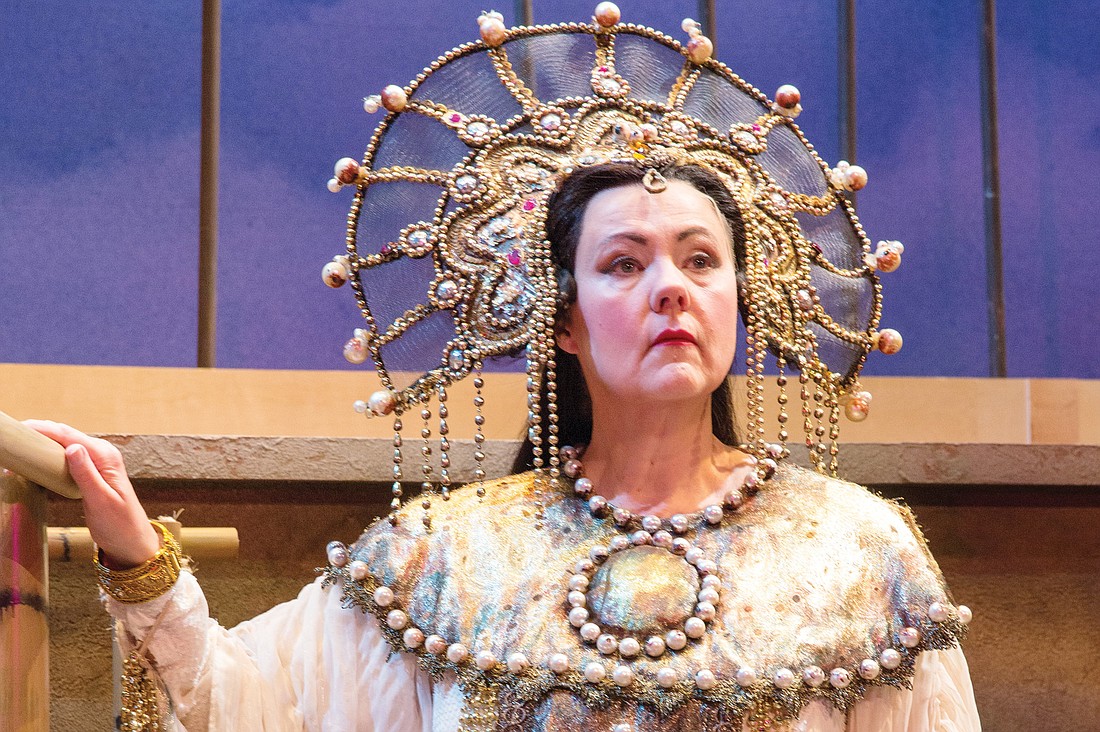- April 19, 2024
-
-
Loading

Loading

The stars were out this weekend when the Sarasota Opera opened its 2013 season with Puccini’s passionate “Turandot.” The largest and most grand of operas Sarasota Opera has presented, this lyric drama of ancient China calls for the most singers on stage and instrumentalists in the pit. Before the curtain went up, with visions of Zeffirelli chock-a-block in our brains, we feared director Stephanie Sundine would go for enormous and fill the stage with teeming throngs so busy the music would be overwhelmed, or she’d go for a chamber mini version that would look trivial.
Sundine did neither. Rather, she — with the help of scenic designer Michael Schweikardt and lighting designer Ken Yunker — turned the comparatively diminutive area into a microcosm of ancient Peking, using the chorus, which, in this opera is one of the most important characters, to comment on and advance the drama.
And drama there was. Princess Turandot, played with just the right mix of icy trepidation and melting passion by Brenda Harris, is an almost super-human figure. She thinks she is beyond human, a goddess, too aloof and superior to be touched by the evil promulgated, she’s sure, by men. Untouchable, impeccable and, most importantly, unattainable, this ice princess is terrified of men because they silenced the beautiful voice and life of an adored ancestor and she will not allow that to happen to her.
Harris, with a voice bigger than all Peking itself, manages to combine the steely resoluteness of the princess with the terrified woman beneath and, through a trio of incomprehensible Chinese riddles, entices men from afar to guess the answers and marry her or fail at the riddles and lose their heads.
Threes abound in “Turandot.” Along with the three riddles, there are three courtiers — Ping (Matthew Hanscom); Pang (Marvin Kehler); and Pong (Eric Bowden), harlequin-type characters, clowns and pawns of the court, who, in Sundine’s brilliant staging and their believable acting and singing, become mere men, pining for their hometowns and fearing for the future of their beloved China.
Thanks to the Unknown Prince, Jonathan Burton, this opera has a happy ending, because he’s not only kind and compassionate, he’s also smart, and he, of all Turandot’s suitors, unravels her riddles and wins her hand. Burton has some unraveling to do with the audiences, as well. While he must match the steely but beautiful Turandot in both voice and eminence, he must also convince an audience, whose ears have been filled with the sound of Pavarotti, and sing the role and the well-known aria, “Nessun dorma,” like a god. Burton did it all and came away with a roar of well-earned approval.
Puccini, a great man of the theater, has inserted other characters into “Turandot,” who make this tale even more believable. Sarasota Opera stalwart basso Young Bok Kim, with makeup and hair designed by Gabrielle Vincent and Anne Ford-Coates of Elsen Associates, looks more ancient than the Great Wall, itself, but sounds rich and poignant as Timur, a deposed Tartar king and father of the Unknown Prince.
Maria Natale is the honorable, beautiful young slave girl Liu who has aided Timur on his travels until he’s reunited with his son. Sometime in the past, the Prince smiled at Liu and she fell madly in love. In her first aria, “Signore, ascolta,” Natale’s warm lyric soprano simply melted the final words, “ah … pieta … ” and the audience instantly fell in love with her.
This is an opera about love. The Prince doesn’t want Turandot as a prize; he wants her to love him. So, even after he’s solved the riddles and won her, he decides to put a riddle to her and, if she solves it by dawn, he will still lose his life. But, if she cannot find the answer, she will be his. His question seems simple: She must tell him his name. Only Liu knows and, realizing she may break under torture, she kills herself — for love. And that melts the icy façade Turandot has carried all those years.
The Sarasota Opera production melts our hearts, as well. Yunker’s way with lighting and color (look for the magnificent green night sky with twinkling stars that blooms into a renewed dawn in the third act!) and Howard Tsvi Kaplan’s understated peasant costumes compared with the splendor of Turandot’s robes, make this a miniature giant-of-a-production.
Then, there’s the all-important orchestra in the pit, which, under the direction of Victor DeRenzi, played at its very best. DeRenzi has gotten inside this score and melded orchestral sound with vocal opulence to the best possible effect. We wish they and the first-rate chorus would have had a curtain call to call their own.
This is a “Turandot” that could teach past productions and performers a thing or two about theater, proving big isn’t necessarily better. They nailed it. Zeffirelli, eat your heart out!